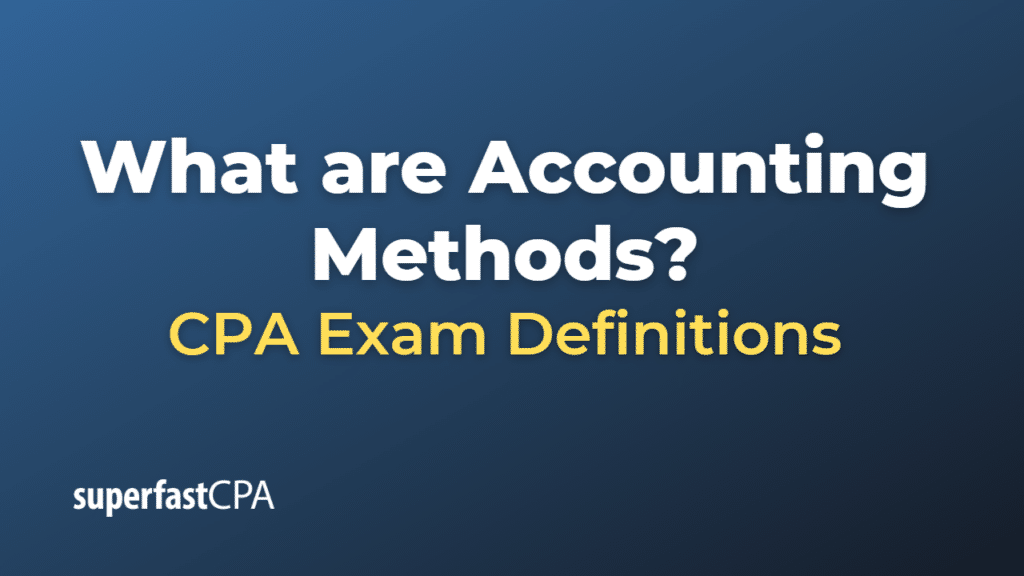Accounting Methods
Accounting methods are the rules and procedures a company follows to record, classify, and report its financial transactions. The choice of accounting method significantly impacts how a company’s financial performance and position are presented in its financial statements. There are two primary accounting methods:
- Cash Basis Accounting: Under the cash basis method, revenues are recognized when cash is received, and expenses are recognized when cash is paid, regardless of when the related services or goods were provided. This method is straightforward and easy to understand, but it may not accurately reflect a company’s financial performance and position, especially for businesses with significant receivables, payables, or inventory. Cash basis accounting is generally suitable for small businesses, sole proprietorships, and businesses with minimal inventory.
- Accrual Basis Accounting: Under the accrual basis method, revenues are recognized when they are earned (i.e., when goods are delivered or services are provided), and expenses are recognized when they are incurred (i.e., when goods or services are consumed), regardless of when the cash is received or paid. This method provides a more accurate picture of a company’s financial performance and position, as it matches revenues and expenses with the related economic activities. Accrual basis accounting is required for publicly traded companies, larger private companies, and businesses that report their financial statements under Generally Accepted Accounting Principles (GAAP) or International Financial Reporting Standards (IFRS).
In addition to these primary methods, companies may also choose specific accounting policies and practices within the framework of their chosen method, such as inventory valuation methods (FIFO, LIFO, or average cost), depreciation methods (straight-line, declining balance, or units of production), and revenue recognition criteria (percentage of completion or completed contract).
The choice of accounting method depends on a company’s specific needs, the size and nature of its operations, and its financial reporting requirements. It is essential for companies to consistently apply their chosen accounting method to ensure comparability and consistency in their financial statements.
Example of Accounting Methods
Let’s consider a hypothetical example of two small businesses, “FreshBakery” and “HandyServices,” to illustrate the differences between cash basis and accrual basis accounting methods.
FreshBakery is a small bakery that sells bread, pastries, and other baked goods. The business primarily deals in cash transactions and has minimal inventory. HandyServices is a small handyman business that provides repair and maintenance services to residential and commercial clients. The business invoices clients for services rendered and has some receivables and payables.
Scenario: Both businesses complete a $1,000 job for a customer on December 28, 2023. The customer pays FreshBakery in cash immediately, while HandyServices invoices the customer, who pays the invoice on January 5, 2024.
- Cash Basis Accounting:
For FreshBakery:
- FreshBakery records the $1,000 revenue on December 28, 2023, when it receives the cash payment.
For HandyServices:
- Under cash basis accounting, HandyServices records the $1,000 revenue on January 5, 2024, when it receives the cash payment from the customer.
- Accrual Basis Accounting:
For FreshBakery:
- FreshBakery records the $1,000 revenue on December 28, 2023, when it completes the job and delivers the baked goods to the customer.
For HandyServices:
- Under accrual basis accounting, HandyServices records the $1,000 revenue on December 28, 2023, when it completes the job and provides the services to the customer, even though the cash payment is received later.
In this example, FreshBakery’s cash basis and accrual basis accounting methods produce the same result, as the cash transaction occurred at the same time as the delivery of goods. However, for HandyServices, the cash basis method results in recognizing the revenue in a different accounting period than the accrual basis method, which could impact its financial statements and tax liabilities.
These examples demonstrate how the choice of accounting method can significantly affect the timing and recognition of revenues and expenses, and ultimately, the presentation of a company’s financial performance and position.













